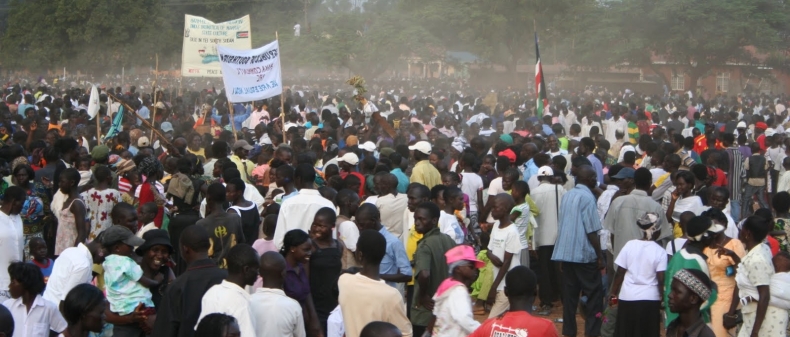
As the respective leaderships of Sudan and South Sudan engage in an escalating war of words, something resembling a real war is breaking out not too far away along the border that separates what used to be Africa’s largest country.
Recent months have seen fighting in border regions, aerial bombardments of Southern towns by the Sudan Armed Forces (SAF), and a battle for control of a key oilfield, among other clashes.
The alarmingly hostile rhetoric coming from both the North and South demonstrates both sides’ predilection for brinkmanship and willingness for war.
Since South Sudan’s independence last July, peace between the two countries has seemed like less and less of a realistic possibility. Ninety-eight per cent of the South’s population voted for secession in a referendum mandated by 2005’s Comprehensive Peace Agreement (CPA), a peace deal that ended Sudan’s decades-long civil war, in which an estimated two million people died and four million were displaced.
Because the CPA prioritized the hope for unity over the threat of separation, a host of critical issues were left unresolved. Disagreements over seemingly elemental things like borders, citizenship, oil infrastructure, and shared debt have further muddled an already complicated situation, and made the two Sudans’ interdependence and shared history more of a liability than an asset.
In a country where colonial policies historically favoured an elite group of Muslim, Arabised Northerners, power and wealth have long been concentrated among a select few and the marginalization of and injustice against certain groups has been the norm. The conflict has often manifested itself in racism and religious hatred, with ethnicity and faith becoming the proxy battleground over unequal access to resources.
Despite the promise it held for some, the South’s independence did not alleviate either side’s suspicion of the other.
In fact, raging nationalism has resulted from the split and seems to have exacerbated the animosity.
In a speech just days after the IMF announced that Sudan’s economy was expected to shrink by 7.3 per cent in 2012 with consumer goods rising 23.2 per cent, Sudanese President Omar al-Bashir addressed Southern Sudanese, vowing to rid them of their “insect” leaders, a pun involving the Arabic word for movement and the South’s leading political party, the Sudan People’s Liberation Movement (SPLM).
Rhetoric in the South is similarly anti-North and, by extension, anti-Arab, with government officials and the public proclaiming war to be the only option. A comment on the Facebook page of a popular radio personality captions a picture of SPLA–the SPLM’s military wing–fighters manning missiles with, “That is the solution to Arabs.”
At a government rally in Juba a crowd made up of some 1,000 youth chanted “down with Bashir” and “down with Ban Ki-moon” and some burned the Sudanese flag, according to a Reuters report.
Al-Bashir, whose 23-year-long grasp on the presidency is weakening, is desperate to maintain power and bolster public opinion of him and his National Congress Party (NCP). And the perception of an outside threat from the South is doing just that, empowering him to mobilize support internally, while deflecting from the real, every-day issues faced by most Sudanese.
The strategy seems to be working: state television is regularly airing footage of civilians cheering for war and rallying around their president.
Rather than address the issues facing their countries – inflation, rising prices, and poor infrastructure, among other things – al-Bashir and South Sudan President Salva Kiir, and their respective cronies, appear more concerned with manipulating their populations into legitimizing war.
Though millions of people in both countries are affected by limited access to healthcare and infrastructure, fear, and hatred, of each other seems to trump all other sentiment.
For its part, South Sudan has proved as much interested in regime change in the North as in its own state-building. For instance, the decision to shut down oil production earlier this year, after accusations that the North was diverting Southern oil, was aimed as much at hurting Sudan as looking out for its own domestic interest. While the move cost South Sudan an estimated $4-bln in revenue, it was ruinous to the North’s already crippled economy.
Perhaps more tellingly, the SPLM/A joined forces with rebels from the regions of Darfur, Blue Nile, and South Kordofan under an alliance called the Sudan Revolutionary Front (SRF). Together, the SRF’s singular goal is to topple al-Bashir, but the group does not appear to have any political ambitions beyond replacing the NCP with a vaguely democratic, pluralistic government. The North is also interested in dismantling the South’s government, but has not expressed any viable alternative.
While armed struggle could very well bring about the fall of either, or both, governments, it’s unclear what either group’s long-term goals are, and to what extent they have considered the costs and consequences more fighting will have on two already war-weary populations.
Should the SRF successfully depose al-Bashir’s government, Sudan’s lack of a defined opposition will likely throw the country into a power vacuum, with different regional groups clambering for power chaotically and, it’s likely, violently.
Similarly, in the South, where an imbalance in the division of power has left many groups disgruntled with each other and with the ruling Dinka majority, the scenario of a government collapse has equally disastrous implications.
South Sudan’s oil resource would give the involvement of foreigners incentives, including other East and Central African countries, and could destabilize the region in one fell swoop.
While the circumstances were different in Somalia, it’s a similar power vacuum, and a wealth of arms, that pushed that country to spiral out of control into regions controlled by warlords and with no centralized government to speak of.
In the meantime, it is the innocent who will bear the brunt of conflict, continuing to lose their lives, homes, and livelihoods. And yet another Sudanese generation will learn the cost of war firsthand.
___________
Follow Rawiya Kameir on Twitter @rawiya.
For more, follow us on Twitter @TorontoStandard and subscribe to our newsletter.















